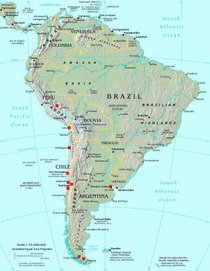A little politics in the middle of it all
One topic that is avoided, yet inevitable in Chile is the rule and impact of Augusto Pinochet, the President of Chile from 1973 to 1990, who took power through a military coup from the socialist elected president, Salvador Allende. The opinions seem so varied in this discussion, yet you cannot ask people how they feel about it- you have to wait for them to talk about it. These are the opinions that I have found so far, and I believe I am interpreting them correctly.
There are some people, like A, who feel Pinochet was an oppressive dictator - like the Hilter of Chile. He harmed the country and it's people by taking away and violating human rights. The thousands of people that were killed and tortured cannot be excused at any point in time.
Then, there are the Machiavellians, like J. They believe that Pinochet followed "ends justify the means" to a T. For them, Pinochet is a savior, who not only improved Chile's economy, but helped it become more sustainable for the future. They don't seem to mind any of the accusations that have been brought against Pinochet, and believe, or seem to believe, that the deaths and tortures are excused by the benefits that Chile experienced. These people also seem to be of the higher class.
Current socialists in Chile also fit into the debate. G thinks that, for example, it is a horrible system to have all retirement completely privatized, something that Pinochet did. The tradition of Pinochet has pushed Chile to the right, the socialists claimed more to the right even of the U.S. They want to get away from this tradition and make Chile more liberal. And although the economy might be doing well for Chile, they don't think it is a fair system.
Finally, the last group that I know of, and where I think most Chileans fit in, is that yes, Chile's economy is good right now and it is probably thanks to Pinochet's economic choices as President. However, the cost of human life had nothing to do with improving the economy. To them, these changes and improvements could have been made without human rights violations.
Although I would love to know everyone's opinions about Chile's history and the past's relationship with the present and future, the topic is still a faux pas here. If you are in the wrong company you can easily make a mistake that leads to an awkward situation. Some people feel very strongly on both sides of the debate and from what I understand, having the wrong opinion can be socially dangerous.
Instead, I wait for it to be brought up by someone that I am talking with whether my (what I believe is a uneducated and unexperienced) opinion differs or if my opinion agrees, I will probably just nod my head and let them do the talking.


3 comments:
Hej, det låter som en väldigt vettig strategi. När man är utlänning, speciellt från USA, så ska man nog inte kommentera alltför starkt om ett annat land. De kan alltid vända det och säga att USA är minsann inget föeredöme...på någon front. När vi var i Tyskland träffade vi en tysk som uttryckte all den USA fientlighet som man kan finna i andra länder. Problemet var att han gick så långt att man fick lust att bara säga emot honom och försvara saker som man annars är kritisk emot!
ah i find the whole politics and pinochet thing incredibly interesting. i really do wish it was more of an open subject because i would love to hear what everyone here has to say about it.
it´s just strange because, of course, what people remember have sometimes nothing to do with what really happened. you know for that econ paper i wrote, i studied a lot of what pinochet did so that i could argue against it, and well basically the economy did not do as well as everyone thinks it did because of him. for example, inflation went sky high, and the poverty level reached 5 million (it was something like 40% of the population). what happened was that there would be a crisis worldwide, then it would get better and everyone would think it was because of pinochet, and then he would have a referendum promoting that he saved the economy and got voted in again... so basically there were changes after democracy got reinstated but not huge system changes, small ones i guess, and thats why there was so much economic growth etc in the 90s which is the real reason why its so well off right now, but not doing as well as in the 90s for a number of reasons, starting with the argentina crisis in 2003....
...and there are a lot of people who believed that the change from pinochet to democracy never affected them...
im not an expert, thats just what i gather.
Post a Comment